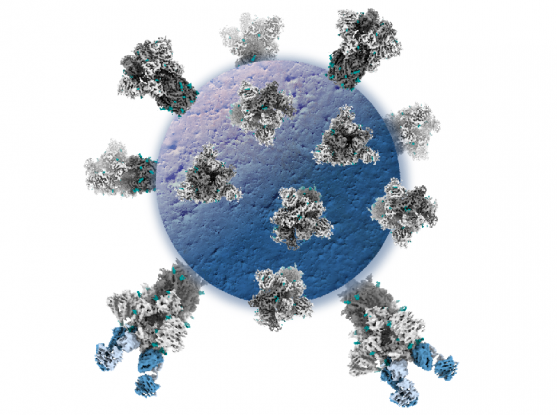How B cells fight the COVID-19 virus

A study of antibody-producing B cells from patients who recovered from COVID-19 reveals a new cross-reactive antibody and what makes some B cells more effective at neutralizing the virus.
Inside the body of a person with COVID-19, the immune system's B cells are engaged in a full-scale battle with the SARS-CoV-2 virus. But some B cells are better at this than others. Now, scientists from the Broad Institute of MIT and Harvard, Massachusetts General Hospital, California Institute of Technology, Brigham and Women's Hospital, and other institutions have for the first time described key characteristics of B cells that are effective at neutralizing, or inactivating, the SARS-CoV-2 virus and related coronaviruses.
The team studied blood samples from 14 people who recovered from COVID-19, and revealed distinct patterns of gene expression in B cells that produce antibodies that bind tightly to and neutralize SARS-CoV-2. They also discovered a new antibody, BG10-19, which neutralizes the virus, variants of concern such as ones first identified in the UK and South Africa, and the coronavirus that caused the 2003 SARS outbreak.
The findings, published today in Cell, could help scientists better understand why some people don't respond as well to existing COVID-19 vaccines or therapies, a first step toward improving vaccines and treatments.
"By studying COVID-19 patients who recovered from the virus, we learned a lot about the body's defense mechanisms. We found that not all B cells are the same, and that some are super antibody-producers. The findings offer insight into how to design antibodies that can neutralize several coronaviruses," said Ramnik Xavier, co-senior author of the study, a core institute member at the Broad, director of the Klarman Cell Observatory and Immunology Program, co-director of the Infectious Disease and Microbiome Program, director of the Center for Computational and Integrative Biology at Mass General and a professor of medicine at Harvard Medical School. "This work was the result of an amazing multi-institutional collaboration involving caregivers, immunologists, computational biologists, and structural biologists."
Better B cells
B cells, or B lymphocytes, are key players in the body's adaptive immune response. In the days following a new viral infection, B cells produce antibodies that recognize unique parts of the invading virus, tagging it for destruction by other immune cells. Eventually, some of these B cells are stored as "memory B cells," helping the body more quickly launch an attack against the same virus in the future.
While other scientists have studied antibodies that bind strongly to SARS-CoV-2—and used that information to design vaccines and therapeutics—Xavier's group wondered whether there was anything unique about the B cells that produced these powerful antibodies.
"The hope is to eventually understand why some people have a stronger immune response against COVID-19, or to the existing vaccines," said Johannes Scheid, co-first author of the new paper, a research fellow at Broad in Xavier's lab, and a gastroenterology fellow at Mass General.
Scheid, along with other co-first authors Christopher Barnes of the California Institute of Technology, Basak Eraslan of the Broad, and their colleagues analyzed blood samples from 14 COVID-19 patients diagnosed in March 2020. The samples were from a COVID-19 biobank that is a collaborative effort between the Broad, Biogen and Mass General Brigham.
The researchers investigated the B cells from each patient and found more than 6,000 that bound to the SARS-CoV-2 virus. They narrowed in on 92 antibodies from the four individuals whose serum most strongly neutralized the virus, and studied the B cells that produced these antibodies.
The B cells that reacted most potently with SARS-CoV-2 had unique patterns of gene expression, and these patterns were shared across different patients. The B cells that most strongly bound to and neutralized the virus belonged to cell populations called memory B cells and activated B cells. These B cells produced mostly antibodies known as immunoglobulin G (IgG) rather than other immunoglobulin types.
"To understand where some of the current immune responses fall short, it'll be important to have a map of what a successful B cell response looks like," said Scheid. "That's what we've done here—we've created a portrait to which we can now compare other immune responses."
The researchers next hope to characterize B cell responses in immunosuppressed COVID-19 patients and look at whether the B cell response to current COVID-19 vaccines is similar to what they saw in the COVID-19 patients they studied. That, eventually, might let researchers understand how immunological memory in vaccinated individuals differs from that in people who recovered from COVID-19, and how to better protect immunosuppressed patients against COVID-19.
Antibody insight
When the research team looked at the antibodies produced by the most potent B cells, one antibody in particular, known as BG10-19, caught the researchers' attention. BG10-19 not only neutralized all variants of the SARS-CoV-2 virus that were studied, including those known as the South African and the UK variants, but also neutralized SARS-CoV, the virus that caused the 2003 SARS outbreak.
Collaborating with structural biologists including Christopher Barnes, Pamela Bjorkman and others at the California Institute of Technology, the researchers went on to show how BG10-19 neutralizes SARS-CoV-2. While BG10-19 attaches to an area on the virus that other antibodies also recognize, the team discovered that it binds in a way that hasn't been previously described, locking the virus into a closed conformation.
The group plans to carry out more studies on which coronaviruses BG10-19 neutralizes, if and how the virus can escape the antibody, and whether BG10-19 can be altered to be effective against a wider array of potentially harmful coronaviruses.
"The ability to bind to so many different coronaviruses means that this antibody could be a good starting point to engineer new antibodies we can use broadly in the future," said Scheid.
More information: Johannes F. Scheid et al. B cell genomics behind cross-neutralization of SARS-CoV-2 variants and SARS-CoV, Cell (2021). DOI: 10.1016/j.cell.2021.04.032




















